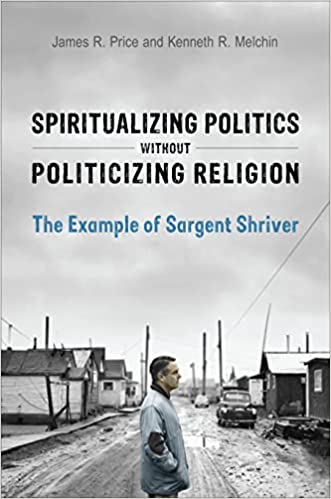New book on Sargent Shriver | First Director of the Peace Corps
 Spiritualizing Politics Without Politicizing Religion: The Example of Sargent Shriver
Spiritualizing Politics Without Politicizing Religion: The Example of Sargent Shriver
by James R. Price and Kenneth R. Melchin
University of Toronto Press
March 2022
200 pages
$33.91 (Kindle); $35.70 (Hardcover)
The clash of religion and politics has been a persistent source of polarization in North America. In order to think wisely and constructively about the spiritual dimension of our political life, there is need for an approach that can both maintain the diversity of belief and foster values founded on the principles of religion.
In Spiritualizing Politics without Politicizing Religion, James R. Price and Kenneth R. Melchin provide a possible framework, approaching issues in politics via a profile of Sargent Shriver (1915–2011), an American diplomat, politician, and a driving force behind the creation of the Peace Corps. Focusing on the speeches Shriver delivered in the course of his work to advance civil rights and build world peace, Price and Melchin highlight the spiritual component of his efforts to improve institutional structures and solve social problems. They contextualize Shriver’s approach by contrasting it with contemporary, landmark decisions of the U.S. Supreme Court on the role of religion in politics. In doing so, Spiritualizing Politics without Politicizing Religion explains that navigating the relationship of religion and politics requires attending to both the religious diversity that politics must guard and the religious involvements that politics needs to do its work.
Authors
James R. Price is the executive director of the Sargent Shriver Peace Institute — Kenneth R. Melchin is a professor emeritus in theology and director of the Lonergan Centre at Saint Paul University.
John,
There was one aspect of Sarge’s life that I didn’t know about until I left PC/W staff. During WW II, he served as a Gunnery Officer on a Destroyer in the South Pacific. The same with Warren Wiggins, who flew the storied ‘Hump’ in WW II, bringing in supplies to our ground forces in the Burma Theater, with high casualty rates for pilots. I knew nothing about their participation in WWII from either of them, although I served on their staff. They were examples of living in the present and projecting that into a future. Their past was their past and they didn’t need to trade on it.
In 1962, Sarge engaged in lively airmail arguments with me, a lowly PCV in Ethiopia. I was one of many volunteers who received answers to burning questions from the Director. In 2002, toward the end of his career, I helped Shriver craft his argument for the “Fourth Goal,” which may be summarized as an advocacy of American democratic values. The concept was promoted by Shriver but never adopted by Congress. In both instances, I came to see that Sargent Shriver was a voice for ideas championed by others—people like Father Theodore Hesburgh and Martin Luther King. Sarge was neither a priest nor a politician, but rather a seeker after truth that would solve problems and improve the lives of others.